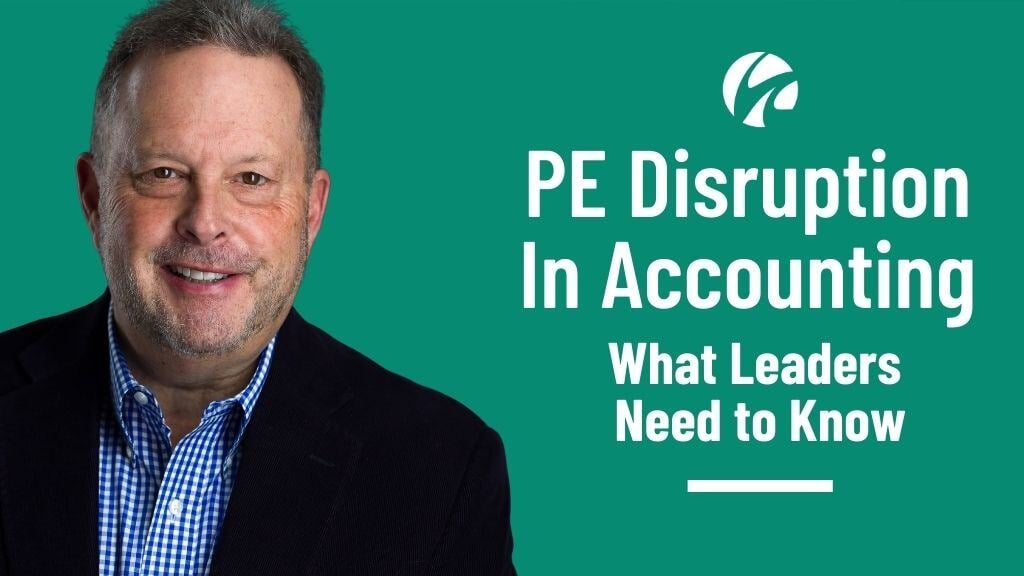PE Disruption in Accounting: What Leaders Need to Know
Private equity is transforming the accounting industry, reshaping mergers and acquisitions, and presenting both challenges and opportunities for...
4 min read
by:
![]() Winding River Consulting
on
Apr 30, 2025
Winding River Consulting
on
Apr 30, 2025
Table of Contents

The rules of success in accounting are being rewritten.
While organic growth challenges and private equity consolidation create competitive pressures, artificial intelligence and evolving client expectations open doors to new service models and efficiency gains. This dynamic environment presents firm leaders with both significant hurdles and strategic opportunities—those who thoughtfully recalibrate their approaches to growth, talent development, and long-term sustainability will find themselves positioned to thrive in this transformed landscape.
In a recent discussion, Winding River Consulting’s Gary Shamis and David Toth explored the biggest concerns and opportunities Managing Partners are facing today, offering insights into growth strategies, the private equity landscape, and the role of AI in the profession. Here’s what firms need to focus on to stay competitive and future-proof their success.
One of the biggest concerns we’re hearing from firms is slowing organic growth rates. While many firms have experienced several consecutive years of double-digit revenue growth, many are now experiencing a change in where and how those opportunities are being developed. Growth today requires more intentional and strategic efforts than ever before accelerated by the political and economic influences.
Firms need to embrace a multi-faceted growth strategy that includes:
We see an emerging opportunity in the middle market. With consolidation moving many firms upstream, many middle-market businesses lack a trusted advisor as large firms increasingly prioritize enterprise-level clients. Mid-sized firms can capitalize on this gap by providing high-touch advisory services to businesses generating between $10 million and $300 million in revenue.
For a mid-sized CPA firm with $50M or so in revenues, this client profile is a natural fit. But many leaders are beginning to wonder whether $50M firms are in a difficult middle ground—too big to stay small but too small to compete with billion-dollar firms and PE-backed consolidators.
We firmly believe that $50M firms can still thrive—but only if they focus on:
Many firms are grappling with an innovative concept in the industry: subscription-based pricing for CPA firms. This recurring revenue style model has gained significant traction in recent years as many firms launch ‘stickier’ advisory service lines like CAS, HR, and Technology Services, but it’s a model that could be expanded further.
Firms could monetize their role as trusted advisors through a retainer model, ensuring guaranteed revenue while managing capacity challenges. Consider the concierge medicine model: people will pay a premium for on-demand access to a high-quality experience. However, implementing this type of change is no easy task, and many firms are afraid to be the first to try it.
Private equity (PE) remains one of the most polarizing and complex issues in the profession. The recent Citron deal at 15x EBITDA has raised questions about whether these valuations are sustainable.
There are several major concerns to be aware of with PE-backed firms:
The key takeaway? Independent firms need to focus on profitability and succession planning to remain competitive against PE-backed firms and avoid internal pressure to sell.
AI is reshaping accounting right now––and if your firm doesn’t have a comprehensive strategy, its falling behind. Forward-thinking firms should be thinking not just about AI tools, but about firm-wide AI adoption strategies.
How Firms Are Using AI Today:
The biggest challenge firms face isn’t just choosing the right AI tools—it’s preparing their teams for AI adoption. Firms need to:
The rise of firm consolidations and PE deals is putting new pressure on CPA firm alliances. Larger alliances, like the BDO Alliance, are evolving to provide more value to firms. However, smaller alliances may struggle to remain competitive in a rapidly changing environment.
As firms navigate growth strategies, independence decisions, and industry shifts, alliances that offer business development support, knowledge sharing, and leadership training will become increasingly valuable.
With all these industry shifts, one factor remains unchanged—the need for strong leadership. The ability to develop, mentor, and retain the next generation of firm leaders is more critical than ever.
At Winding River Consulting, we work with firms to train the next generation of partners and managing partners, helping them navigate growth, business development, and client leadership with intentional strategy and proven frameworks.
If you’re serious about emboldening the leadership competencies of your firm, explore our leadership development programs, including our Managing Partner Bootcamp and Basic Training Bootcamp.
🔗 Learn More About Our Leadership Programs

Private equity is transforming the accounting industry, reshaping mergers and acquisitions, and presenting both challenges and opportunities for...

5 min read
Over the years, I’ve consulted with numerous accounting firms, and a recurring theme is the lack of clear and transparent criteria for becoming a...

1 min read
Cleveland, OH, June 25, 2024 — Winding River Consulting is excited to announce the launch of its newest leadership development program — Basic...